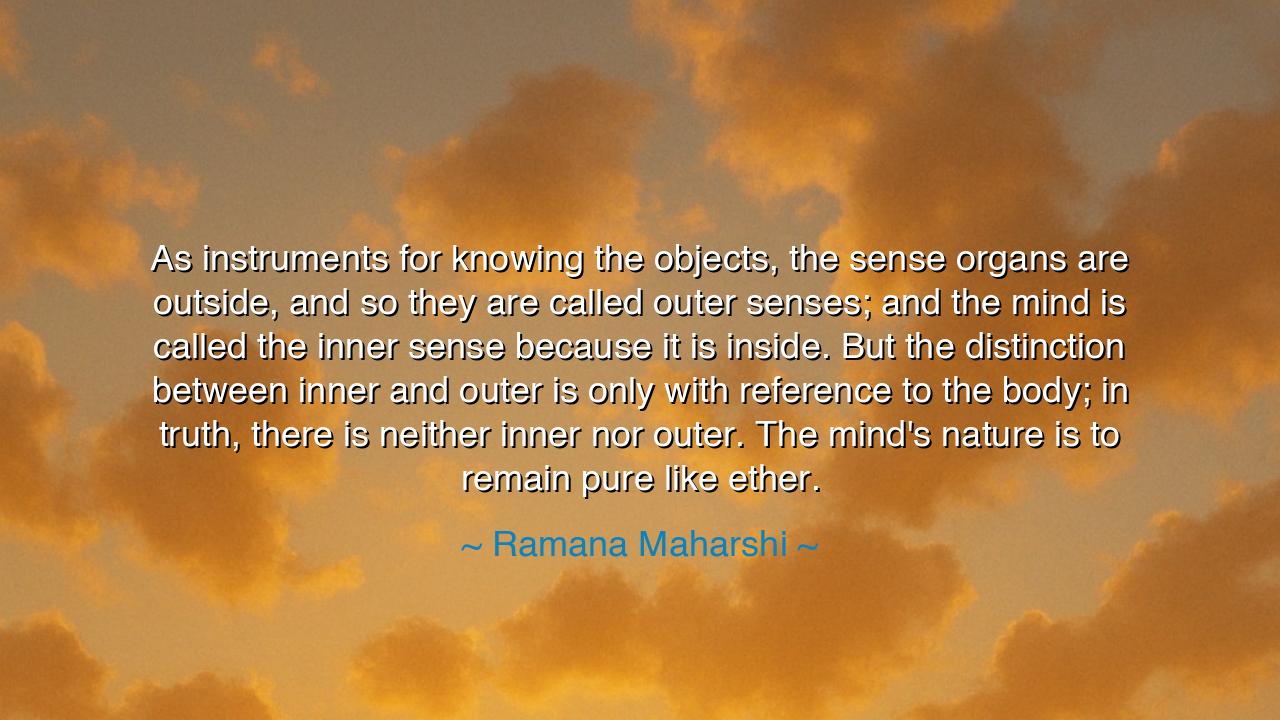
As instruments for knowing the objects, the sense organs are
As instruments for knowing the objects, the sense organs are outside, and so they are called outer senses; and the mind is called the inner sense because it is inside. But the distinction between inner and outer is only with reference to the body; in truth, there is neither inner nor outer. The mind's nature is to remain pure like ether.






In the teaching of Ramana Maharshi, we are given a vision that pierces the veil of ordinary perception: “As instruments for knowing the objects, the sense organs are outside, and so they are called outer senses; and the mind is called the inner sense because it is inside. But the distinction between inner and outer is only with reference to the body; in truth, there is neither inner nor outer. The mind's nature is to remain pure like ether.” These words draw us beyond the limits of flesh and thought, pointing to the essence of consciousness, which transcends all divisions of inner and outer.
The origin of this teaching is found in the timeless quest of sages and seekers to understand the relationship between the body, the senses, the mind, and the Self. Ramana, living as a mystic on the slopes of Arunachala, spoke from direct realization: that while the eyes see form and the ears hear sound, and while the mind reflects upon these impressions, beyond all of this is the awareness that is not bound by the body. The distinctions of “inside” and “outside” are conveniences for the limited intellect; in the realm of truth, they dissolve, as rivers dissolve into the sea.
The imagery of ether is especially profound. Ether, or space, holds all things yet is not stained by them. It is infinite, untouched, and transparent. So too is the nature of the mind in its purest form—not the restless mind filled with thoughts, but the underlying clarity, the mirror that reflects yet remains unchanged. To recognize this is to find peace, for the Self is not limited by the comings and goings of sensation or thought. It is vast, serene, and eternal.
History offers echoes of this insight. Consider the teachings of the Stoics, who declared that the soul is part of the divine Logos, unbound by the shifting fortunes of the outer world. Or recall the wisdom of the Upanishads, which proclaimed that the Self is neither within nor without, but all-pervading, like fire hidden in wood, awaiting discovery. Even in modern science, we find parallels: the cosmos itself is not divided into neat compartments of inner and outer, but is an unbroken field, where every atom sings in harmony with the whole.
There is also a practical wisdom here. If one believes only in the “outer senses,” one is tossed about by the ever-changing world: pleasure and pain, gain and loss, praise and blame. If one clings only to the “inner sense,” one may drown in endless thoughts, illusions, and dreams. But when one realizes that these distinctions are only with reference to the body, one awakens to a freedom that cannot be shaken. The mind, in its pure state, becomes like a clear sky in which clouds may pass but never linger.
The lesson for us is this: do not become enslaved to appearances. Do not believe that truth lies only in the outer world of objects, nor that it lies only in the inner world of thought. Instead, look deeper into the ground of awareness itself, the pure ether of the mind, where there is no boundary between in and out. There you will discover your own true nature, which is freedom, clarity, and peace.
Practically, this teaching invites us to cultivate stillness. Spend moments each day observing the senses without clinging, watching the mind without judgment, and resting in the awareness that holds them both. Meditation, prayer, or even silent contemplation of the sky can open this door. In time, the rigid walls of inner and outer will fade, and what remains will be the vastness of your own being.
Thus, Maharshi’s words carry the timeless wisdom of the seers: that the Self is beyond all dualities, that inner and outer are illusions of the body, and that the mind’s true nature is as infinite and unsullied as the ether. Carry this teaching in your heart, O seeker, and you will walk not as one confined to a narrow chamber, but as one dwelling in boundless space.






AAdministratorAdministrator
Welcome, honored guests. Please leave a comment, we will respond soon